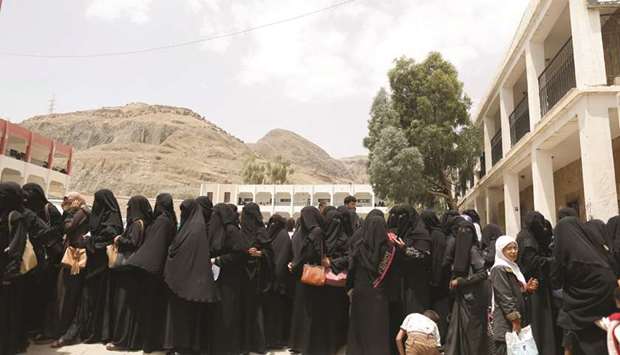Travelling by bus or taxi with children in tow, scores of mothers have fled fighting in Yemen’s key port city of Hodeidah in recent weeks, finding shelter at a school in the rebel-held capital Sanaa.
About 70 families, minus most of their men, have temporarily settled at the Abu Bakr al-Siddiq school, nestled amid rocky mountains on the capital’s southern outskirts, converting classrooms and corridors into makeshift living quarters.
Clashes have raged in their hometown since June 13 as Yemeni government forces backed by a Saudi-led coalition press an offensive to oust Houthi rebels from the Red Sea port city.
“The situation was very, very bad with bombings, air raids and rocket fire. We couldn’t sleep or eat...so we fled to Sanaa with our children,” said mother Dorrah Ismail.
She comes from Hodeidah’s southern suburbs, not far from the city’s airport, which was taken Wednesday by loyalist forces backed by Saudi Arabia and the United Arab Emirates after a week of heavy clashes.
Government troops and their regional allies are aiming to seize Hodeidah port, the main entry point for desperately-needed aid into a country on the brink of famine.
While some male family members accompanied the women and children to Sanaa, most quickly returned home to look after their property or to fight.
The Hodeidah offensive, dubbed Operation Golden Victory, is the most intense battle so far in a war that has killed nearly 10,000 people and displaced millions.
The Saudi-led military coalition has been fighting in Yemen since 2015 to restore the internationally recognised government to power after Houthi rebels took over Sanaa the year before.
Since January 1, more than 30,000 people have been displaced by fighting in Hodeidah province, including 3,000 from the region’s eponymous capital and port, according to the United Nations’ humanitarian co-ordination agency.
“More people are fleeing areas of conflict and seeking shelter in safer locations, including in the capital, Sanaa,” OCHA said Thursday, without giving new figures on the displaced.
Ismail said this was the first time she had been to the capital.
“Why? Because of the war in Hodeida,” she said.
Umm Ahmad, another mother, said Houthi rebels “bombed our houses, cut off the streets and the water around us...we had nothing to eat or drink”.
“Our children were hungry and never stopped crying,” she said.
The Norwegian Refugee Council says fresh water has not reached many parts of the city since Tuesday.
“The residents are now counting on water provided by mosques,” the charity said.
The NRC said access to clean water was of particular concern given the “emergency health situation due to cholera”, which has killed more than 2,000 people in Yemen in around a year.
Residents said rebels had blocked the city’s main roads with trenches, mounds of sand and rubbish bins.
“We couldn’t send someone to the market to buy food because of the clashes,” said Sabah Mohamed, another Hodeidah resident currently at the school in Sanaa.
“We heard explosions and we couldn’t sleep...so I decided to take my daughters and leave the city,” she said.
“I couldn’t do anything else...the taxi cost me 32,000 riyals,” she said.
The $60 (50 euro) fare was equivalent to an average monthly salary in Yemen. As the displaced families wait for help from aid groups, people living nearby have brought them food, blankets and clothing — a sign of solidarity in what has long been the Arab world’s poorest country.
But with the battle for their hometown far from over, they have no idea when they might be able to return.
“We were afraid, for our children and for ourselves,” said one women, sitting in the school yard with her children.
“The sound of the jets brought our little ones to tears.”

Women displaced by the fighting in the Red Sea port city of Hodeidah queue to register in a school allocated for IDPs in Sanaa, yesterday.
